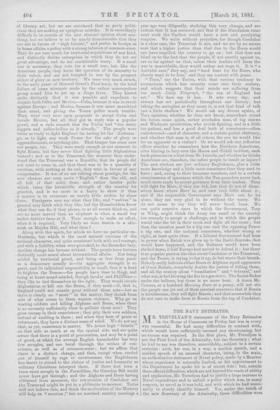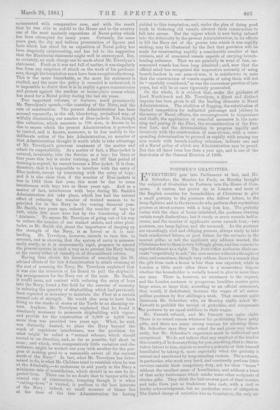THE NAVY ESTIMATES.
11 R. TREVELYAN'S statement of the Navy Estimates in the House of Commons on Friday last was in every way successful. He had many difficulties to contend with, which would have sufficiently excused any shortcoming, but no excuse was required. In the first plane, Mr. Trevelyan is not the First Lord of the Admiralty, but the Secretary ; what ho had to say was therefore, unavoidably, subject to a certain restraint ; next, his was, in a way, a maiden speech, and a maiden speech of an unusual character, being, in the main, an authoritative statement of Naval policy, made by a Member whose experience is naturally limited, as his appointment to the Department he spoke for is of recent date ; but, outside these official difficulties, which are not beyond the reach of ability and application, Mr. Trevelyan had to justify a large increase to Naval expenditure and to unfold a policy which was, in many respects, as novel as it was bold, and with which he had neces- sarily to closely identify himself. Yet, under the touch of the new Secretary of the Admiralty, these difficulties were
surmounted with comparative ease, and with the result that he was able to unfold to the House and to the country one of the most masterly expositions of Naval policy which has been attempted for many years. Certainly, for some years past, the dry and tedious presentation of figures and facts which has stood for an exposition of Naval policy has been singularly uninteresting, and has led to the suggestion that the Ministerial statement might well be stereotyped. But, as certainly, no such charge can be made about Mr. Trevelyan's statement. Fresh as it was and full of matter, it was singularly free from any suspicion of attack on the work of his predeces- sors, though the temptation must have been exceptionally strong. This is the more remarkable, as the more his statement is studied, and the more the policy it revealed is understood, it is impossible to doubt that it is in reality a grave remonstrance
and protest against tho random or laissez-faire course which
has stood for a Naval policy during the last six years.
Two important reforms, or features, mark prominently Mr. Trevelyan's speech,—the manning of the Navy, and the rate of construction, The present Administration has been accused repeatedly, in the old, blundering, prejudiced way, of wilfully diminishing our number of Blue-jackets. Yet, though this reduction, which amounts to 700 men, is known to be due to causes which the present Administration is powerless to control, and is known, moreover, to be due mainly to the deliberate action of the late Administration, no member of that Administration thought it worth while to take advantage of Mr. Trevelyan's generous treatment of the matter and admit its responsibility. As a matter of fact, a Blue-jacket is entered, invariably, into the Service as a boy ; for three or four years this boy is under training, and till that period of training is expired, he cannot become a Blue-jacket. It is clear, therefore, that it is impossible to interfere with the entry of Blue-jackets, except by interfering with the entry of boys ; and it is also clear that, if the number of Blue-jackets is less in 1881 than last year, this must be due to some interference with boys two or three years ago. And as a matter of fact, interference with boys during Mr. Smith's Administration did take place, which has had the natural effect of reducing the number of trained seamen to be provided for in the Navy in the coming financial year. Mr. Smith, two years ago, reduced the number of boys by 500, while 200 more were lost by the foundering of the ' Atalanta.' To accuse Mr. Trevelyan of going out of his way to reduce the number of our trained sailors, and utter plati- tudes, as Mr. Smith did, about the importance of keeping up the strength of the Navy, is as forced as it is mis- leading. Mr. Trevelyan, however, intends to turn this to account, and in showing that the system of entry is unneces- sarily costly, as it is unnecessarily rigid, proposes to amend the present system in such a way as to prevent the Navy being at the mercy either of casualty or of ill-considered reform.
Having thus shown his intention of remedying the ill- advised efforts of the late Administration to attain economy at the cost of manning the Navy, Mr. Trevelyan explained that it was also the intention of his Board to pull the shipbuild- ing arrangements for the Navy out of the mire. Mr. Smith, it would seem, not content with reducing the entry of boys into the Navy, found a fair field for the exercise of economy in reducing the quantity of shipbuilding which had previously been regarded as necessary to maintain the Fleet at a certain normal rate of strength. Ho would also seem to have been living on the stocks of stores at the Yards to an alarming ex- tent. Anyhow, Mr. Trevelyan explained that he found it absolutely necessary to prosecute shipbuilding with vigour, and provide for the construction of 3,000 or 4,000 tons more than was provided two years ago. What, he said, was distinctly wanted, to place the Navy beyond the reach of capricious interference, was the provision for what might be called a " normal scheme, which should exceed in no direction, and, as far as possible, fall short in none ; and which, with comparatively little variation and dis- turbance, might be worked one year with another for the pur- pose of making good to a reasonable extent all the current needs of the Navy." In fact, what Mr. Trevelyan has deter- mined to do, is what Mr. Childers tried to establish when lie was
at the Admiralty,—to endeavour to add yearly to the Navy a
minimum rate of construction, which should in no case be de- parted from. There can be no doubt that to tamper with the annual rate of construction, 'tempting though it is when " cutting-down " is wanted, is perilous to the best interests of the Navy ; indeed, no small measure of blame lies at the door of the late Administration for having yielded to this temptation, and, under the plea of doing good work in tinkering old vessels, allowed their construction to fall into arrear. But the vigour which is now being infused into the Admiralty by the present Administration, in its efforts to lift the Navy out of the grocive into which it was rapidly sinking, may be illustrated by the fact that provision will be made for constructing rapidly a considerable number of fast cruisers, and of armoured vessels capable of carrying breech- loading ordnance. That we are painfully in want of fast, un- armoured vessels has been long admitted ; and, now that the official mind has recognised the imperative necessity of using breech-loaders in our men-of-war, it is satisfactory to note that the construction of vessels capable of using them will not be " carefully considered," as was the convenient practice of late years, but will be at once vigorously prosecuted. On the whole, it is evident that, under the guidance of Lord Northbrook and Mr. Trevelyan, a direct and distinct impulse has been given to all the leading elements in Naval Administration. The abolition of flogging, the substitution of limited competition for unlimited patronage and jobbery in the -entry of Naval officers, the encouragement to temperance and thrift, the application of remedial measures in the man- ning and paying of the Fleet, the reconsideration of the Pen- sion List, and the determination to progress rapidly and decisively with the construction of men-of-war, with a corre- sponding determination to proceed as rapidly with arming our new vessels with breech-loading ordnance, indicate one and all a Naval policy of which any Administration may he proud. But this all dates from less than a year ago, and is one of the first-fruits of the General Election of 1880.



































 Previous page
Previous page